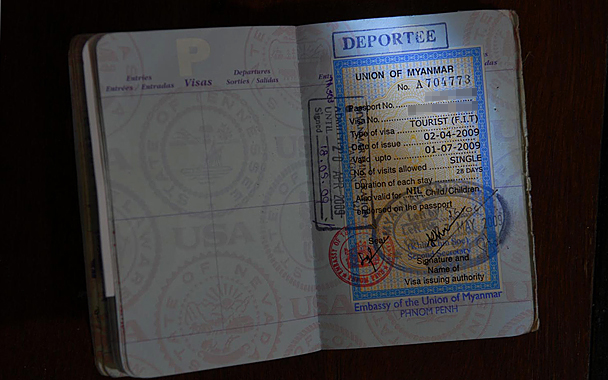My husband and I were arrested in Mandalay, stuck on a sweltering 16-hour train to Yangon (in the company of two immigration officers who had neither phones nor weapons), and sent on a plane to Bangkok after another seven-hour wait. We were given no explanation, and nobody involved seemed to have any idea what was going on. Everyone said the orders came straight from Naypyidaw (the government capital). Curiously, the arrest came within an hour after both of us finished teaching our workshops—mine on feature writing, Jerry’s on photography—all properly arranged by The American Center, a wing of the U.S. Embassy, with full Burmese government approval.
While in Myanmar, we worked hard to avoid any “journalistic” appearance, but rumors suggest the government might have thought we were working on sensitive stories. Yet the only story we had in mind was a small piece on laphet thote (pickled tea-leaf salad), explaining the flavors, history, and cultural significance of the Burmese delicacy. True, laphet thote came under scrutiny in recent weeks after a harmful dye was found in many of the leaves and the government pulled dozens of packaged brands from the shelves. But my feature idea had nothing to do with that. In fact, I wasn’t even thinking about it.
In Mandalay, a colleague introduced us to the owner of a longstanding laphet thote business. That man invited us to see his operation, which we did, and also to visit a trade center where people buy and sell pulses (the dried seeds from various legumes such as beans, peas, and lentils) that are key ingredients in the salad. We never had a chance to see the center. Sources tell us, though, that the invitation might have been enough to arouse suspicion. Whatever the reason, an overnight train ride through the countryside gives a good picture of a different story entirely—little electricity, lots of thatch huts and naked kids running alongside the train begging for water bottles and food scraps.
Throughout our ordeal, most everyone along the way was kind, especially the immigration cops who brought us coffee and washcloths on the train. An officer in the airport told us he knew we’d been traveling all day and night. He offered us food and drink and a comfortable place to wait for our flight. This was nice, but disconcerting: Few Burmese citizens would receive such treatment in similar circumstances.
Not all government workers agree with government policy. We encountered one official during our Burma stint who told us, “Many people in Western countries think the government staff and the government are the same. We are not.” Then, he whispered something dangerous: “We care for democracy.”
The whole ordeal left a hole in our hearts. And new stamps in our passports: “Deportee.”




 Pinterest
Pinterest


